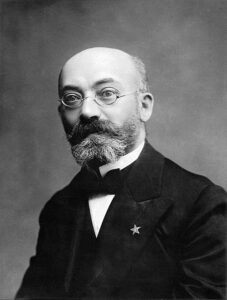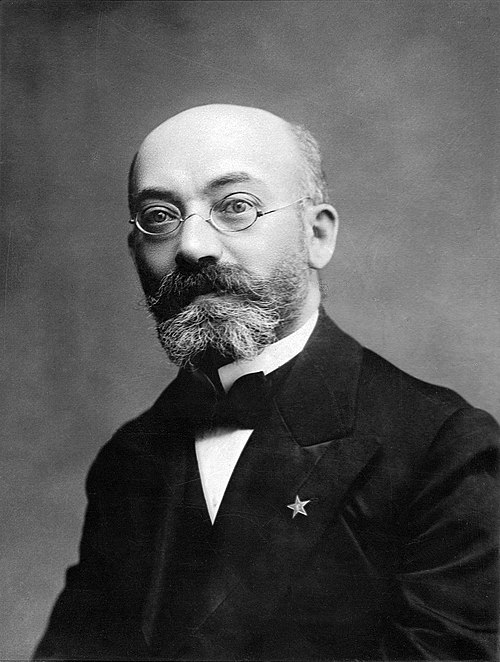
What is Esperanto? Esperanto is a language constructed by L. L. Zamenhof in 1887. He meant it to be the international language.
Around the world there are 2,000 native speakers of Esperanto and 100,000 people that can speak it. The word “Esperanto” means “one who hopes”. It is an artificially created language and the most widely spoken artificial language in the world. It is different to all other languages on Earth because it didn’t evolve to be what it is. The English I am writing in, for example, has gone through many huge changes over the last thousand years at least. It has evolved and will continue to evolve. Esperanto did not evolve to be what it is, it was created by one man. His goal was to make a language that people could learn very easily and use to communicate in. His goal was noble because he wanted to put an end to the miscommunication that led to war.
The language was created by Ludwik Lejzer Zamenhof, a linguist and ophthalmologist. He was born and raised in an area that is now in Poland, but at the time was part of the Russian Empire. He grew up speaking Russian and Yiddish. His father taught him French and German as well. By the time he finished school, he also spoke Polish, Latin, Greek, Aramaic, English, Italian, and some other languages as well. This knowledge of language made him the perfect person to create a new language. Zamenhof felt that one of the main reasons why there was so much trouble and violence in the world was because people didn’t have a common language they could use to communicate. Latin had been the world’s language, but that was replaced by Spanish and French. By the 19th century, English had become the main international language, but English was hard to learn because it had so many grammatical inconsistencies, and that’s before you even get to spelling and pronunciation rules. Zamenhof decided to create a language that would be simple and easy to learn. He published it in a pamphlet in 1887, called “Unua Libro”. He explained his theory and rules for the language, which he called “la lingvo internacia” (the international language). He didn’t use his real name for the pamphlet. He used the pseudonym Doctor Esperanto. In his new international language, Esperanto means “one who hopes”, so the pamphlet was written by a doctor who hopes. The people who were attracted to the language called it Esperanto’s language, which because Esperanto.
So, how easy is the language to learn? It appears fairly simple because Zamenhof designed it to have no irregular forms and exceptions to rules. Here are a few of the rules. Unlike English, there is no indefinite article. The only article is “la”. This doesn’t change for gender or anything else, unlike in French or German. All nouns end with “o”, all adjectives with “a”, all plurals with “j”, all adverbs end with “e”. Verb endings are straightforward, unlike in English. The present tense ends with “as”, the past with “is”, and the future with “os”. All prepositions have fixed meanings and the comparative and superlative are made by adding “pli” and “plej” at the end of an adjective. Unlike English where you have more beautiful, most beautiful, but happier and happiest, with no one really sure what to do with clever. (Cleverest? Most clever?) The intonation of multisyllable words is decided and all words are pronounced exactly as they are spelled, which English was before the Great Vowel Shift.
So, if Esperanto is so easy to learn and straightforward, why hasn’t it been picked up? There are three reasons. Firstly, it is a very European centered language, with a lot of the words very similar to those in the romance languages. It is easier to learn than a natural language. And secondly, Esperanto was demonized by the Nazis and Stalin’s Soviet Union. Speakers were rounded up and either imprisoned or killed. This was enough to put anyone off learning it, which meant the language didn’t take. It is only relatively recently that the number of Esperanto speakers has taken off. The third reason is probably the most important. Learning Esperanto doesn’t help anyone. It can be an interesting hobby and learning another language is never a bad thing, but it won’t help you in a foreign country and it won’t help you to get a job. If someone is going to spend a lot of time and money learning a language, then English, Chinese, or Spanish are probably their first choices. Kaj tion mi lernis hodiaŭ.
Sources
https://en.wikipedia.org/wiki/Esperanto
https://en.wikipedia.org/wiki/Unua_Libro
https://en.wikipedia.org/wiki/L._L._Zamenhof
https://www.theguardian.com/lifeandstyle/2003/jul/12/weekend.davidnewnham
Image By Unknown author – Bildarchiv Austria, Public Domain, https://commons.wikimedia.org/w/index.php?curid=77157840

